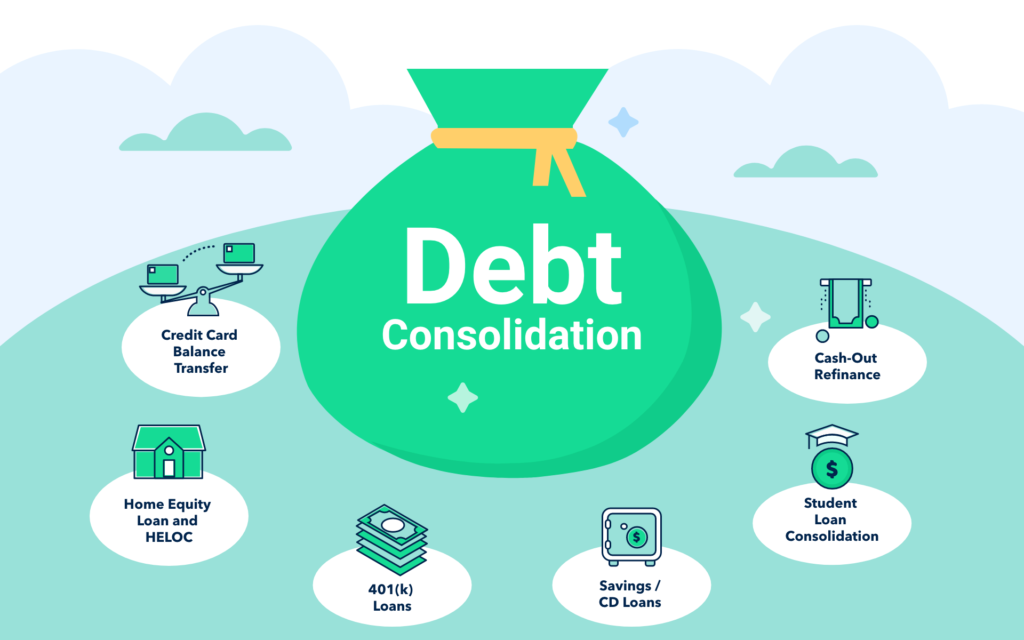
Are you juggling multiple high-interest debts and searching for a solution? A debt consolidation loan could be your ticket to financial freedom. This comprehensive guide will walk you through how to consolidate credit card debt, use a personal loan for debt, and take control of your money—all while keeping SEO best practices and relevant internal and external links in mind.
1. What Is a Debt Consolidation Loan?
A debt consolidation loan is a single personal loan used specifically to pay off multiple debts, like credit cards, medical bills, or other high-interest loans. By combining them into one installment loan, you simplify your monthly payments and often benefit from a lower interest rate (discover.com, td.com).
2. Key Benefits of Debt Consolidation
✅ Lower Interest Costs
Credit cards often carry APRs above 20%, but consolidation loans usually range from 8–15%, substantially reducing overall interest payments .
✅ Simplified Finances
One monthly payment is easier to manage and reduces the risk of missed bills .
✅ Clear Repayment Timeline
Installment loans have fixed terms—36 to 84 months—giving you a definitive payoff date (discover.com).
✅ Potential Credit Improvement
Collapsing high credit utilization and paying consistently helps improve your credit score over time .
3. When to Choose This Strategy
| Situation | Is It a Good Fit? | Reason |
|---|---|---|
| Multiple credit card balances | ✅ Yes | You’ll likely secure a lower rate than credit cards (freedomdebtrelief.com, investopedia.com) |
| Credit score above 650 | ✅ Yes | More favorable interest rates |
| Existing 0% balance transfer offers | ⚠️ Maybe | Could be cheaper, but terms may be limited |
| Low credit score or unstable income | ⚠️ Maybe | May need a secured loan or credit counseling instead |
4. Step‑by‑Step Guide to Getting a Debt Consolidation Loan
- Check Your Credit Report
Get your free report from AnnualCreditReport.com and fix any errors. - Use Pre‑qualification Tools
Sites like NerdWallet or Credible show personalized offers without impacting your credit score. - Compare APR and Fees
Look beyond interest—check origination fees, late fees, and prepayment penalties. - Choose a Fixed‑Rate Loan
Fixed interest offers stability in monthly payments—especially useful for long-term budgeting. - Apply and Pay Off Old Debt
Use the funds to zero out high-interest accounts. Set up autopay for your new loan to stay on track. - Stick to a Budget
Commit to not adding new credit balances. Use either the snowball or avalanche repayment strategy (more below).
5. Repayment Strategies: Snowball vs. Avalanche
- Debt Snowball: Pay smallest balances first for quick wins—ideal for motivation (en.wikipedia.org, credello.com, discover.com, tegfcu.com, ukfcu.org, td.com).
- Debt Avalanche: Prioritize highest interest debts to save money faster.
Both methods work; pick one to maintain financial discipline and keep moving toward financial freedom.
6. Watch Out for Fees and Potential Traps
- Origination Fees can eat into savings—factor these into your total cost.
- Pre-payment Penalties may negate early payoff benefits.
- Temptation to Re-borrow: Avoid using freed-up credit cards again and falling back into debt.
Always read the fine print and understand the true APR you’re paying.
7. Is a Debt Consolidation Loan Always Right?
If you’re not a good candidate, consider:
- 0% Balance Transfer Cards for short-term solutions
- Debt Management Plans (DMPs) via certified credit counselors (discover.com, td.com)
- Secured Alternatives like HELOCs or 401(k) loans—though they come with added risk to assets
8. How Debt Consolidation Leads to Financial Freedom
- Predictable payments make budgeting easier
- Lower interest frees up money faster
- Fewer accounts reduce stress and missed payments
- Improved credit score through disciplined repayment
The result? More cash flow, less debt, and a clear path to achieving long-term financial goals.
9. Helpful Internal & External Resources
Internal Links:
External Links:
- Investopedia – How to Consolidate Debt: clear definitions and benefits (investopedia.com, self.inc, investopedia.com)
- Business Insider – Best Debt Consolidation Loans 2025: top lender recommendations (businessinsider.com)
- TD Bank – Using Personal Loans for Debt: practical application advice (td.com)
- Debt.org breakdown and counseling options (debt.org)
Final Takeaway
A debt consolidation loan can be a powerful tool toward financial freedom when used wisely. It simplifies payments, lowers interest, and helps improve your credit—only if you avoid accumulating new debt and choose a loan with transparent terms.
Ready to take action? Start with checking your pre-qualification offers today, then pick a strategy and stick to it. Your path to a calmer, more confident financial future starts here.